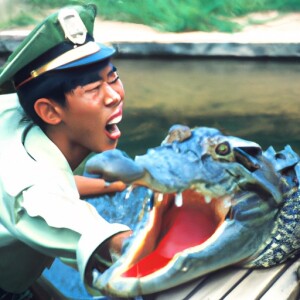
Prepare to be transported back in time to the haunting Battle of Ramree Island, a chilling chapter in World War II that reveals the terrifying intersection of war and nature. On that fateful day, February 19, 1945, the British Indian Army, joined by the Royal Navy, embarked on a daring mission to retake Ramree Island from Japanese occupation. Little did they know that their enemy’s retreat into the nearby mangrove swamps would unleash an unimaginable nightmare.
As the British forces pressed forward, the Japanese soldiers sought refuge in the dense, labyrinthine swamplands. Unbeknownst to them, these murky waters were home to a silent predator – the saltwater crocodile. With lightning speed and stealth, these formidable creatures turned the tables on the exhausted Japanese soldiers, launching a ferocious assault beneath the cover of darkness. The air was filled with the soldiers’ cries for help, mingling with the sounds of jaws snapping shut and water splashing ominously.
The Ramree massacre, a tale of terror, stands as a grim testament to the horrors of war. Out of the approximately 1,000 Japanese soldiers who sought sanctuary in the swamps, a mere 20 survived the nightmarish ordeal. The relentless onslaught of the crocodiles spared no one, leaving a trail of devastation in their wake. The brutality of this animal-inflicted tragedy serves as a chilling reminder that even amidst the chaos of battle, nature can unleash its own unforgiving forces.
In the aftermath of the Battle of Ramree Island, the Ramree massacre captured the world’s attention, fueling fascination and curiosity. Countless accounts and stories emerged, each more spine-tingling than the last. Some tales were undoubtedly embellished, weaving a web of mystery and legend around the massacre. However, due to the tumultuous nature of war and the scarcity of concrete records, the exact details and numbers remain shrouded in controversy and uncertainty.
Nevertheless, the Ramree massacre serves as a stark reminder that armed conflicts yield unforeseen and brutal consequences. It serves as a chilling testament to the fact that war not only inflicts human suffering but also unleashes the raw power of nature. This haunting tale of survival, horror, and the unforgiving forces of nature will forever be etched in history, reminding us of the unpredictable and terrifying realities of war.
